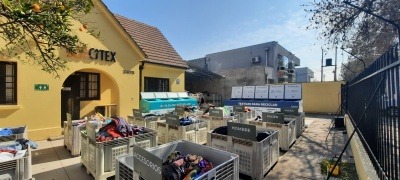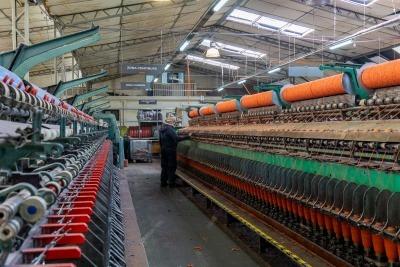Spinning a sustainable yarn: Zero waste textiles in Chile
Ecocitex was set up by Rosario Hevia in 2020 to deal with Chile’s growing textile waste problem. It takes donations of unusable textiles and recycles the fabrics into new yarn that is then resold to clothing manufacturers.
 In 2021, 39,000 tons of waste textiles were found in informal landfills in the Atacama desert in Chile. It is quite possible that most of the dumped clothing came from overseas, with Chile being a leading importer of secondhand clothing from Asia, Europe, the USA and Canada.
In 2021, 39,000 tons of waste textiles were found in informal landfills in the Atacama desert in Chile. It is quite possible that most of the dumped clothing came from overseas, with Chile being a leading importer of secondhand clothing from Asia, Europe, the USA and Canada.
Chile has a well-developed secondhand clothing market, with many stores and clothing markets dedicated to used clothing. However, the country doesn’t have viable options for waste textiles or secondhand clothing that isn’t fit for reuse.
And, this is a problem. Textiles are a significant cause of climate change. According to the World Wear Project, it is estimated that globally over 92 million tonnes of textile waste are created each year, with around 60 per cent ending up in landfill. Textiles carry a heavy carbon footprint – significantly worse than plastic on a weight-for-weight basis, according to a recent study by Zero Waste Scotland.
Rosario Hevia has been trying to rectify that situation. In 2020, she setup Ecocitex – a social enterprise based in Santiago, Chile’s capital city – to turn textile waste into recycled yarn.
A new waste textile management model
A mother of two, Hevia came into the waste textile game after the birth of her second child when she realised the volumes of textiles that had nowhere to go.
That was back in 2018 when she set up Travieso – a used-baby-clothing marketplace. By the end of 2019, Rosario was receiving more than 880 pounds of unusable baby clothing every month – about 20 per cent of the baby clothing donations that she received. With the only other options being landfill or incineration, she searched for an alternative.
In 2019, she came across a yarn factory for sale and it clicked. The damaged clothing could be turned into recycled yarn. In 2020, Ecocitex was founded with the capacity to process 240 tons of textile waste a year.
A donation or a service?
Ecocitex, a shortening of Economía Circular Textil, which translates to Textile Circular Economy, receives textiles from a mix of partnerships and directly from citizens through donation bins.
 Hevia is very specific about what she classes as ‘donations’, telling Resource that clothing received in a bad condition is not considered a donation.
Hevia is very specific about what she classes as ‘donations’, telling Resource that clothing received in a bad condition is not considered a donation.
She said: “We receive clothing in good condition in donations, and clothing in bad condition in the format of service…the customer pays USD$1 per kilogram for us to recycle their clothing sustainably.”
The fee is still a small factor of Ecocitex’s income stream at 8 per cent, with 70 per cent coming from the sale of recycled yarn and other products such as beanies, bucket hats and knitting accessories. 11 per cent is earned from the sale of second-hand clothing, and another 11 per cent from a membership program for benefits such as free recycling without the aforementioned fee, a clothing exchange system, and discount codes.
Recycling the textiles
After the business receives the clothing, it undergoes sorting into piles for selling, waste textiles for recycling, or to be used as eco-fill – scraps of clothing used to stuff boxing bags, cushions, or furniture. None of the clothing goes to landfill or incineration, despite about one ton of textiles being processed every week.

 Any non-textile elements such as zippers, buttons and sequins are removed from the waste textiles pile which is further sorted by colour. The colour-sorted waste textiles then go through a guillotine and a machine which combines, processes and turns the textiles through texturised blades. A chemical binder, a sanitiser to cleanse the product, anti-statics to prevent static build-up, and water are added – no washing or dying takes place in order to avoid polluting local water.
Any non-textile elements such as zippers, buttons and sequins are removed from the waste textiles pile which is further sorted by colour. The colour-sorted waste textiles then go through a guillotine and a machine which combines, processes and turns the textiles through texturised blades. A chemical binder, a sanitiser to cleanse the product, anti-statics to prevent static build-up, and water are added – no washing or dying takes place in order to avoid polluting local water.
Another machine then processes the bales into a soft, fluffy fabric which is cut into strips. A final machine then twists these strands together to build a strong, recycled yarn.
From one ton of textile waste, Ecocitex makes 10,000 balls of 100-gram recycled yarn, which is largely sold through online marketplaces. Each ball of recycled yarn is completely unique due to the hand-sorted individual combinations of the recycled clothes. Ecocitex currently has 41 colour varieties listed on its website.
To process the yarn within the factory, Ecocitex employs formerly incarcerated women through Abriendo Puertas. Swedish multinational furniture maker IKEA – with whom Ecocitex partnered in 2022 – commented that Ecocitex is ‘committed to the personal development of its employees by offering them wellness benefits in partnership with social workers and psychologists that can help with rehabilitation from traumatic life experiences’.
Beyond production
The recycled yarn is sold through Ecocitex’s website, in physical stores, and transported to partnered businesses. Also, to its network of over 260 women-led businesses across Chile: “[The pandemic caused] a lot of new demand for knitting and craft materials with all the conventional stores closing at the same time and people [not being able to] work their normal jobs,” explained Hevia. “So we started building a network of women that could buy our products and resell them with a considerable margin, up to 40 per cent.”
Through the IKEA Social Entrepreneurship scheme and partnership with social enterprise incubator NESsT, the business has been able to increase its production capacity and continue providing services to vulnerable people by donating blankets and clothing to those in need. During the pandemic, the enterprise donated more than 1,000 wool caps to homeless people living on the streets.
It’s a multi-award-winning enterprise, with recognition from CORFO – Chile's national institution of innovation – and recognition from the Green award Premios Latinamérica Verde in 2022.
A circular economy business model
Hevia concluded: “Our purpose [from the start] was to create a circular economy model in which we could eliminate Chilean textile waste in a process that would create a great social impact. We knew from the beginning that we wanted to create a positive effect on society, and that this had to be part of the core [of our business].”
Also looking at the value of recycled yarn, US retailer Patagonia claims to have reduced 94 per cent of its emissions by using recycled wool fibres instead of virgin wool. The recycled wool is sourced from both post-industry and post-consumer streams, such as factory scraps, and returned garments.
It’s processed in a similar manner as in the Chilean factory – sorted by colour and mechanically shredded to be respun. The Italian company Cashpad makes insulation material from recycled wool which is also used in Patagonia’s puffer jackets. For the Spring 2023 season, 9 per cent of Patagonia’s wool products are made of recycled wool.
In January 2023, Zero Waste Europe called a zero-waste textile industry ‘possible’ as long as current fashion business model trends are reversed. Ecocitex is helping to pave the way.









